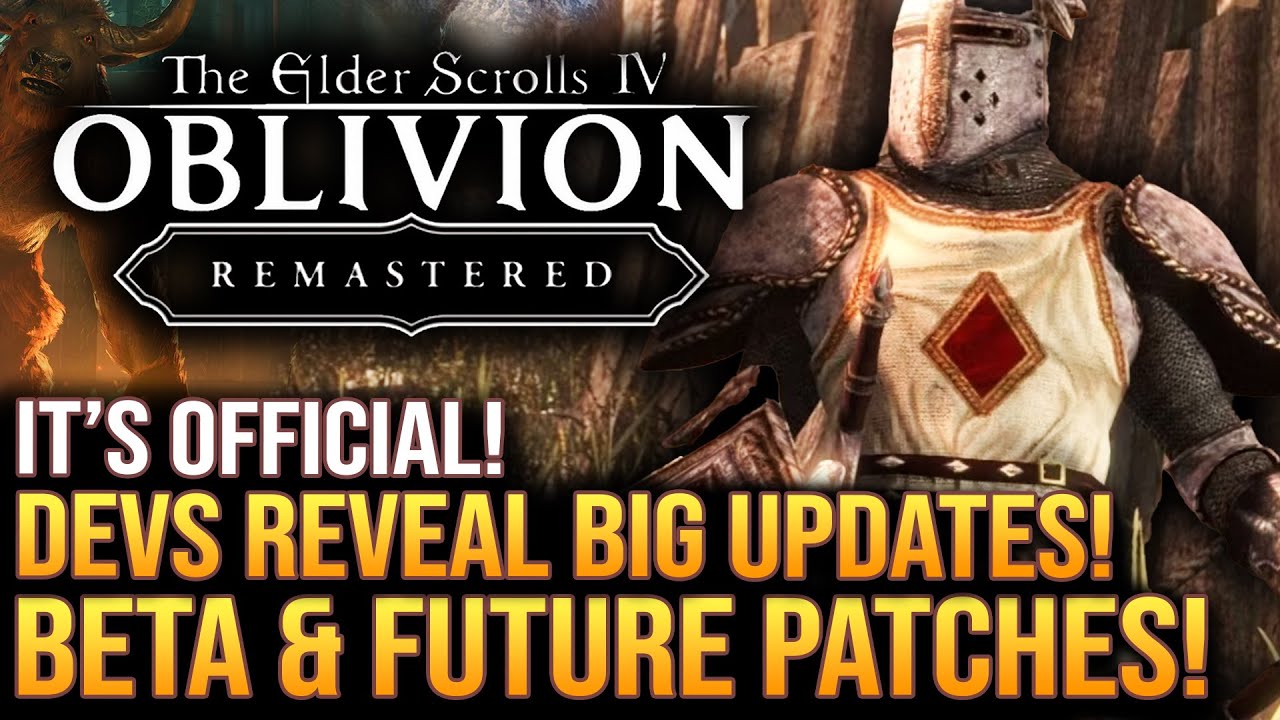Oblivion Remastered Updates and Future Patches Guide
The Elder Scrolls IV: Oblivion Remastered, launched on April 22, 2025, has rekindled nostalgia for Bethesda’s 2006 classic, delivering a visually stunning overhaul powered by Unreal Engine 5, refined gameplay, and all expansions, including Shivering Isles and Knights of the Nine. With over four million players in its first week and a peak of 182,298 concurrent Steam users, the remaster has been a commercial hit. However, its launch was marred by issues: punishing difficulty scaling, performance stutters, and game-breaking bugs like the Kvatch quest glitch. After weeks of community outcry, Bethesda and developer Virtuos have broken their silence, confirming major updates and future patches to address these problems. This article dives into the details of these announcements, explores their impact on gameplay, and speculates on what’s next for Oblivion Remastered, ensuring beginners and veterans can enjoy Cyrodiil’s vast world without frustration.

The State of Oblivion Remastered at Launch
Oblivion Remastered modernizes the original with breathtaking visuals, a new Clairvoyance spell, reworked animations, and a sprint mechanic, all while preserving the core Gamebryo engine for gameplay logic. Despite these enhancements, players encountered significant issues:
Difficulty Scaling: The remaster’s five fixed difficulty tiers (Novice, Apprentice, Adept, Expert, Master) replaced the original’s granular slider. Adept feels too easy, while Expert (3x enemy damage, 0.28x player damage) and Master (6x enemy damage, 0.167x player damage) turn enemies into damage sponges, making combat grindy.
Performance Problems: Traversal stutters, frame-rate drops, and memory leaks degrade performance, especially on PS5, Xbox Series X|S, and PC. Some players report worsening performance the longer they play, with crashes on save loads or door transitions.
Bugs: Quest blockers, like Savlian Matius not responding in “The Battle for Castle Kvatch,” and UI glitches (e.g., invisible weapons, incorrect equipment displays) frustrate players. PC users on Game Pass faced broken upscaling settings after the April 25 hotfix.
These issues sparked vocal criticism on platforms like Steam and Discord, with players demanding fixes for bugs, better difficulty options, and performance optimizations. Bethesda’s initial silence fueled fears of a “pump-and-dump” release, but recent announcements signal a commitment to improving the game.
The April 25 Hotfix: A Rocky Start
The first post-launch update, a 1.9GB hotfix on April 25, 2025, aimed to address backend issues without impacting gameplay. However, it inadvertently broke graphical settings for PC Game Pass users, disabling upscaling and anti-aliasing adjustments, and caused frame-rate drops for some. Bethesda acknowledged the issue, promising a quick resolution, but the lack of official patch notes and mixed results (smoother Xbox performance but PC regressions) left players wary. This hotfix underscored the need for more substantial updates, setting the stage for the June 2025 patch and beyond.
The June 2025 Update (Patch 1.1): A Major Step Forward
On June 5, 2025, Bethesda and Virtuos released patch notes for Oblivion Remastered’s first major update, version 1.1, available in Steam Beta and rolling out to all platforms on June 11, 2025. This update, detailed on Bethesda’s official channels, includes over 50 fixes targeting quests, UI, gameplay systems, and platform-specific issues. Key highlights include:
Quest Fixes: Resolves progression blockers in main quests like “The Battle for Castle Kvatch” (Savlian Matius now responds after clearing enemies), “A Knife in the Dark” (Dark Brotherhood initiation), and “The Sunken One” (side quest). Players no longer need workarounds like looting the Colovian Signet Ring.
UI Improvements: Fixes invisible weapons in menus, incorrect “fists equipped” displays, and inconsistent effect descriptions. The Quests tab, merging Active and Current Quests, now functions reliably.
PC-Specific Fixes: Addresses Alt-Tab freezes, infinite loading screens, and autosave bugs creating endless save groups. Small display resolutions in windowed mode now render correctly.
Xbox Cloud Gaming: Corrects a niche bug mirroring PC settings to Xbox, improving cross-platform consistency.
Visual Glitches: Resolves lingering magical effects (e.g., Restore Health visuals lasting beyond timers) and vampire-related bugs, including sudden baldness during transformations.
Despite these fixes, patch 1.1 doesn’t address performance issues like stutters, frame-rate drops, or memory leaks, which remain a top community concern. Players on X expressed disappointment, with some calling the update “a step forward but not enough” for a game plagued by technical woes. Bethesda has confirmed a second update focused on performance is in development, with details to follow soon.
Community-Driven Fixes: The Unofficial Oblivion Remastered Patch (UORP)
While awaiting official patches, the modding community has stepped up. The Unofficial Oblivion Remastered Patch (UORP), released on April 29, 2025, by the Unofficial Patch Project Team on Nexus Mods, merges fixes from the original Oblivion patches and addresses remaster-specific bugs. It targets scripts, quests, NPCs, items, and dialogue, with over two dozen issues already reported for future updates. Despite early controversies—crashes in stores and visual bugs like misplaced Argonian tails—the UORP has been refined, offering a stopgap for PC players. However, it’s not supported on consoles, and modders warn against using it with older game versions.
Future Patches: What to Expect
Bethesda’s proactive engagement on Discord, collecting player feedback since April 29, 2025, signals more updates are coming. The second announced patch, teased alongside patch 1.1, will focus on performance across all platforms, addressing:
Traversal Stutters: A persistent issue from the original game, worsened by Unreal Engine 5’s demands. The patch aims to reduce hitching during open-world exploration and door transitions.
Frame-Rate Stability: Targets sub-60fps drops in performance mode (Series X, PS5) and uneven 30fps pacing in quality mode (Series S, base consoles). PS5 Pro’s near-4K rendering may see optimizations.
Memory Leaks: Aims to fix performance degradation over long play sessions, potentially caused by memory leaks, ensuring consistent frame rates.
Upscaling Fix: Restores PC Game Pass upscaling settings broken by the April 25 hotfix, improving visual clarity.
Community feedback highlights additional player demands for future patches:
Difficulty Rework: Players find Adept too easy and Expert too grindy. Suggestions include reinstating the original difficulty slider or adding intermediate tiers (e.g., 1.5xme-2x damage dealt/received). A mod like Difficulty Slider Fixed (Nexus Mods) could inspire an official solution.
Enemy Scaling: Toning down level-scaling to prevent enemies like bandits becoming overpowered at high levels, similar to Skyrim’s more forgiving system.
Inventory and UI: Better sorting, weight limit displays, and streamlined menus, as the merged Quests tab and removed local map tab frustrate some.
Sprint Animation: The awkward, hunched sprint could be refined or made optional for a natural look.
Bethesda’s history of supporting mods suggests potential modding tools, despite the remaster’s lack of official support at launch. The UORP’s success shows the original Creation Kit remains partially compatible, and future patches may integrate its fixes, as seen in past Bethesda titles. Players also hope for cloud save fixes for cross-platform play and achievement stability, as autosave glitches currently disable achievements without mods.
Why These Updates Matter
The June 2025 patch and upcoming performance update are critical for Oblivion Remastered’s longevity. The game’s vibrant world, enhanced by Lumen lighting and reworked models, deserves a polished experience. Fixing quest blockers like Kvatch ensures story progression, vital for new players tackling the main quest or expansions. Performance improvements will make exploration seamless, from Cyrodiil’s hills to Oblivion’s fiery planes, while difficulty tweaks could balance combat for all playstyles, whether stealth archer or mage. These updates also reinforce Bethesda’s commitment to its fanbase, countering “cash grab” accusations and preserving Oblivion’s legacy as a landmark RPG.
Tips for Players Awaiting Patches
Use Adept Difficulty: Until difficulty tweaks arrive, Adept offers the best balance. Optimize builds (e.g., focus on Blade or Destruction) to handle scaling.
Install UORP (PC): Download from Nexus Mods for bug fixes, but back up files and ensure game version 0.411.140.0 compatibility.
Save Frequently: Manual saves (Systems menu) prevent progress loss from crashes or autosave glitches.
Report Bugs: Submit issues to Bethesda’s Discord or the UORP bug tracker to shape future patches.
Monitor Updates: Check Steam, Bethesda’s website, or X for patch news, especially for the performance-focused update.
Conclusion
The announced updates for Oblivion Remastered mark a turning point, addressing critical issues like quest bugs, UI glitches, and performance woes that have dampened its triumphant return. Patch 1.1, live in Steam Beta and launching June 11, 2025, fixes over 50 issues, while a second patch promises to tackle stutters, frame-rate drops, and memory leaks. Community feedback for difficulty sliders, enemy scaling, and UI improvements could shape further updates, ensuring Cyrodiil remains a joy to explore. For beginners, these patches make the game more accessible, while veterans can relive Oblivion’s magic without frustration. As Bethesda and Virtuos refine this love letter to fans, Oblivion Remastered is poised to reclaim its throne as one of gaming’s greatest RPGs. Grab your bow, cast Clairvoyance, and prepare for a smoother adventure in Tamriel!





